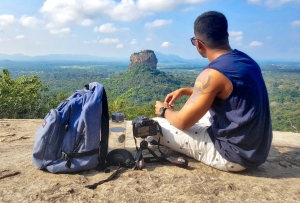A road trip is one of the most exciting ways to explore, whether you're driving across the US to see national parks or setting out on an international adventure through scenic coastlines and historic towns.
The open road promises unforgettable memories. However, poor planning can quickly turn excitement into unnecessary stress.
From choosing routes that avoid delays to packing smartly for convenience, preparation is key to keeping your trip smooth and enjoyable. A little effort beforehand helps avoid last-minute hassles so you can focus on the fun.
Ready for a stress-free journey? Follow these tips to ensure your next road trip is as stress-free as it is memorable!
Choose the Right Route for Fewer Surprises
Careful route planning reduces stress and keeps your trip on track.
Research your options before setting off, taking into account factors like traffic patterns and construction updates. Knowing what to expect along the way helps you avoid delays and frustration.
Stick to routes that suit your preferences, whether that means avoiding highways or choosing faster paths. And be flexible enough to adapt if unforeseen changes arise during the journey.
Here are some tips for choosing the best route:
- Check real-time traffic updates through reliable navigation tools.
- Look up areas with known road closures or detours beforehand.
- Plan alternative routes in case of accidents or unexpected congestion.
By planning ahead, you'll create a smoother driving experience while staying confident about where you're headed.
Pack Smart (Without Overloading Your Car!)
Efficient packing helps keep your trip stress-free and your car organized.
Overloading the vehicle not only creates clutter but also reduces fuel efficiency and makes it harder to find things when you need them.
So, stick to essentials. And consider the weather conditions at your destinations for choosing the right clothes to take with you. Also, use storage solutions like travel organizers or vacuum-sealed bags for your clothing.
Follow these strategies to pack efficiently:
- Keep frequently used items like snacks or water bottles easily accessible.
- Store heavier luggage on the bottom for stability, distributing weight evenly.
- Leave unnecessary items behind to maintain space for souvenirs or other additions during the trip.
A thoughtfully packed car ensures a smoother ride, fewer distractions, and quicker access to whatever you might need along the way.
Set a Realistic Itinerary to Stay on Track
A practical itinerary keeps your road trip organized without feeling rushed.
Overpacking your schedule with too many stops or activities can leave you stressed and exhausted. Instead, allow enough time for breaks, meals, and unexpected delays while ensuring key destinations fit comfortably into the plan.
Be mindful of how long you'll realistically spend at each stop. Factor in driving hours to prevent overly long days on the road.
Here are some tips for creating a manageable itinerary:
- Break your driving time into segments with planned stops every two to three hours.
- Prioritize must-see attractions over optional ones to stay flexible.
- Schedule buffer times between activities in case things run late or take longer than expected.
With a balanced itinerary, you'll have time to enjoy the journey instead of constantly watching the clock.
Communicate Plans with Travel Companions Clearly
Clear communication with your travel companions ensures everyone is on the same page, reducing misunderstandings or conflicts during the trip.
Discuss key details like departure times, stops, destinations, and individual preferences beforehand to avoid surprises.
Involving everyone in the planning process helps create a sense of teamwork and makes sure all voices are heard.
Establishing clear expectations keeps things running smoothly.
Key ways to communicate effectively:
- Share the itinerary so everyone knows planned routes and stops.
- Set ground rules for driving shifts or expenses if applicable.
A shared understanding among companions creates a cooperative atmosphere where every part of the journey becomes more enjoyable.
Budget for Gas, Food, and Unexpected Costs
Planning your budget ahead avoids unnecessary stress during the trip.
Road trips often come with surprise expenses like tolls, parking fees, or last-minute supplies. Estimating costs in advance helps you stay prepared and avoid overspending.
Divide your budget into categories to ensure coverage for essentials without stretching yourself too thin.
And don't forget to account for rising fuel prices or dining at more expensive spots along the way.
Consider these tips when budgeting:
- Use online tools to estimate fuel costs based on mileage and current gas prices.
- Set aside extra funds for emergencies such as car repairs or unexpected delays.
- Pack meals or snacks from home to save money on frequent stops at restaurants or convenience stores.
By organizing a clear financial plan, you'll enjoy peace of mind throughout your journey.
Get the Right Car Insurance Coverage Before You Go
Having proper car insurance coverage ensures you're prepared for any unexpected issues on the road. While most policies include basic coverage, it's worth reviewing your plan to confirm it suits a longer trip or travel across state lines.
Look into additional options like roadside assistance or rental car reimbursement if they're not already included in your policy.
And double-check that you have updated insurance documents accessible while traveling.
Plus, consider car insurance that comes with extra treats. For instance, its4women offers a free beauty treatment, a round of golf, or a European flight.
Also, when reviewing your insurance, keep these points in mind:
- Ensure liability limits meet legal requirements for all states or countries you'll drive through.
- Confirm whether collision and comprehensive coverage apply outside of your home area.
- Add roadside assistance services to avoid costly out-of-pocket expenses during breakdowns.
Preparing your insurance ahead of time gives you confidence to handle unforeseen situations without added stress.
Learn Basic Car Maintenance Skills Before You Leave
Knowing a few basic car maintenance skills can save you time, money, and stress during your road trip. While a professional mechanic can handle most issues, some minor problems can be resolved quickly with the right knowledge.
Understanding how to address common car troubles ensures you're not stranded waiting for assistance in remote areas or during inconvenient times.
Essential skills to learn before traveling:
- How to check tire pressure and inflate tires as needed.
- Changing a flat tire.
- Checking oil levels and other fluids like coolant or windshield washer fluid.
With these practical skills under your belt, you will feel more confident tackling small issues that might arise on the road.
Inspect Your Vehicle for Reliability and Safety
A well-maintained car is crucial for a safe and low-stress road trip. Before hitting the road, check that your vehicle is in good working order to avoid breakdowns or delays during your journey. Small issues left unattended can quickly become major problems.
Schedule a full inspection with a trusted mechanic or perform basic checks yourself if you're confident in doing so.
Key areas to inspect before leaving:
- Ensure tires are properly inflated and have adequate tread depth.
- Check oil levels, coolant, brake fluid, and windshield washer fluid; top up as needed.
- Test lights, wipers, brakes, and battery for proper functionality.
Taking time to address these essentials beforehand reduces risks on the road while ensuring you're traveling confidently toward your destination.
Plan Stops Ahead to Break Up Driving Time
Long stretches of driving can lead to fatigue and make the journey feel overwhelming. Planning stops in advance not only helps you rest but also makes the trip more enjoyable by breaking it into manageable sections.
Choose spots that offer opportunities to stretch, grab a snack, or explore interesting sights along your route.
A mix of short breaks and longer pauses ensures both comfort and safety.
Suggestions for planning effective stops:
- Aim for a break every two to three hours of driving time.
- Look up safe, convenient locations such as rest areas or local parks for quick stops.
- Incorporate fun attractions or landmarks when possible to add variety and excitement.
Scheduling regular pauses keeps everyone refreshed while making the road trip experience more pleasant.
Use Navigation Tools That Work Offline
Relying solely on live navigation apps can be risky, especially in areas with weak or no signal.
Having offline tools ensures you'll stay on track even when connectivity issues arise.
Preparing both digital and physical backups helps you avoid unnecessary detours or confusion.
So, download maps and routes ahead of time through trusted navigation services that offer offline functionality. And keep a printed map handy for quick reference as well.
Tips for reliable navigation:
- Save key locations like gas stations, hotels, and landmarks to your device before leaving home.
- Familiarize yourself with the general layout of your route so you're not completely dependent on technology.
- Carry an up-to-date paper map as an emergency backup option.
Staying prepared with dependable navigation keeps your road trip running smoothly without interruptions.
Prepare Entertainment Options for Passengers
Long drives can become monotonous, especially for passengers. Keeping everyone entertained ensures a more enjoyable experience and prevents boredom or restlessness during the journey.
Thoughtfully planned entertainment options should cater to all ages and preferences in your group.
Consider both individual activities and shared experiences to make the trip engaging for everyone involved.
Ideas to keep passengers entertained:
- Download audiobooks or podcasts that appeal to the entire group.
- Bring travel-friendly games like cards or trivia challenges for interaction during breaks.
- Create playlists with music that suits everyone's tastes, alternating between genres as needed.
With entertaining options ready, passengers will stay engaged throughout the trip.
Have an Emergency Kit Ready in Case of Trouble
Taking an emergency kit with you is essential for staying safe and prepared for any unexpected situations on the road.
Whether it's a flat tire, sudden weather changes, or minor injuries, having the right supplies can make all the difference.
Assemble a well-stocked kit that includes both vehicle essentials and basic first aid items to address various scenarios.
Include these essential items in your emergency kit:
- A flashlight with extra batteries for nighttime issues.
- Jumper cables or a portable jump starter for dead batteries.
- A basic first aid kit with bandages, antiseptic wipes, and medications.
Having an emergency kit ensures you're ready to handle small setbacks calmly while keeping everyone on your trip safe and secure.
Check Weather Forecasts Along Your Planned Path
Weather can significantly impact your road trip, so keeping an eye on forecasts is crucial for a smooth and safe journey. Unexpected storms, snow, or heavy rain may delay your plans or create hazardous driving conditions.
Check weather reports for the entire route as well as alternative paths in case of sudden changes. Regular updates help you prepare appropriately for any challenges ahead.
Steps to plan around the weather:
- Monitor daily forecasts leading up to and during your trip using reliable sources.
- Pack weather-specific items like umbrellas, blankets, or extra clothing layers if necessary.
- Adjust departure times or routes to avoid severe conditions when possible.
By staying informed about the weather, you'll feel confident and prepared no matter what nature throws at you.
Research Gas Stations on Your Route
Running out of fuel in an unfamiliar area can add unnecessary stress to your road trip. Researching gas stations along your planned route helps you avoid last-minute scrambles to find a fill-up point, especially in rural or less populated areas.
Knowing where gas stations are located also allows you to plan stops efficiently and compare fuel prices if budget is a concern.
Here's how to prepare:
- Identify stretches of your route with fewer refueling options and plan accordingly.
- Note operating hours for smaller or remote gas stations that may not be open late.
- Use online tools beforehand to estimate the distance between fueling points on long drives.
A little preparation ensures you'll always have enough fuel, keeping the journey smooth and worry-free.
Secure Important Documents Like IDs and Insurance Papers
Carrying essential documents ensures you're prepared for any situation requiring identification or proof of insurance during your road trip.
Having these papers accessible can save you time and stress in cases like roadside checks, accidents, or hotel check-ins.
Keep all necessary documents organized in one secure location that's easy to access but protected from potential damage.
Important documents to bring along:
- Driver's license and vehicle registration paperwork.
- Proof of car insurance that meets legal requirements for the areas you'll travel through.
- Any reservation confirmations (e.g., hotels or attractions) printed out as a backup.
Organizing these items ahead of time helps prevent unexpected hassles so you can focus on enjoying the road.
Plan Healthy Snacks to Avoid Junk Food Overload
Keeping nutritious snacks on hand is essential for staying energized and feeling good during your road trip. Relying solely on fast food or gas station snacks can lead to fatigue, unhealthy eating habits, and unnecessary expenses.
By preparing a variety of healthy options ahead of time, you'll have easy access to satisfying foods that keep everyone fueled between stops.
Here are some smart snack ideas for the road:
- Fresh fruit like apples or grapes that are portable and mess-free.
- Protein-packed options such as nuts, seeds, or trail mix.
- Whole-grain crackers or granola bars for long-lasting energy boosts.
With thoughtful snack planning, you'll maintain steady energy levels while avoiding the pitfalls of processed junk food along the way.
Make Accommodations Reservations in Advance When Needed
Securing accommodations ahead of time eliminates the stress of searching for last-minute lodging during your road trip. Popular destinations, especially during peak travel seasons, can fill up quickly, leaving you with limited options.
Booking in advance gives you more choices and allows you to plan your stops around convenient overnight locations that suit your budget and preferences.
Tips for booking accommodations:
- Research hotels, motels, or campgrounds near planned stopping points along your route.
- Look for flexible cancellation policies in case plans change unexpectedly.
- Consider booking family-friendly or pet-friendly places if traveling with kids or pets.
By arranging accommodations before setting off, you'll enjoy peace of mind knowing exactly where you'll rest each night.
Carry Backup Chargers or Power Banks for Devices
Keeping your devices charged is essential for navigation, communication, and entertainment during a road trip.
Relying solely on car chargers can be risky if the vehicle's power ports fail or if you need to charge multiple devices simultaneously.
Backup chargers ensure you're always connected and avoid disruptions caused by dead batteries in crucial moments.
What to pack for reliable charging:
- Portable power banks with enough capacity to charge phones or tablets multiple times.
- Extra cables compatible with all your devices, ensuring you have spares if one fails.
- A multi-port USB adapter for charging several items at once while in the car.
Staying powered up helps maintain communication, access maps, and enjoy entertainment without unnecessary interruptions.
Understand Local Driving Laws Along the Way
Driving laws can vary from state to state or country to country, and understanding these differences helps you avoid fines, legal issues, or unsafe situations during your trip.
From speed limits to cell phone usage regulations, being informed ensures smoother travel.
Familiarizing yourself with key rules ahead of time gives you confidence as you navigate unfamiliar areas.
Important points to research:
- Speed limit variations in different regions (especially for highways vs. local roads).
- Rules regarding phone use while driving, such as hands-free requirements.
- Unique traffic laws like right-on-red permissions or turn signal practices.
By staying aware of local driving regulations along your route, you'll ensure a safe and lawful journey wherever the road takes you.
Schedule Enough Sleep to Stay Alert on the Road
Fatigue is one of the biggest risks during long road trips, so prioritizing sleep is essential for safe driving.
Being well-rested ensures you stay alert, react quickly to unexpected situations, and avoid accidents caused by drowsiness.
Planning your trip with adequate rest stops and overnight stays allows drivers to recover properly before getting back behind the wheel.
Ways to prioritize rest while traveling:
- Stick to a consistent schedule for sleeping and waking whenever possible.
- Share driving responsibilities among companions if fatigue sets in.
- Take short power naps at safe locations if you're feeling tired mid-trip.
Maintaining proper sleep keeps everyone refreshed, ensuring both safety and enjoyment throughout your journey.
Keep a List of Emergency Contacts Handy
Having a list of emergency contacts readily available can be invaluable during unexpected situations on the road.
While your phone stores contact information, it's helpful to have a physical or easily accessible backup in case your device loses power or connectivity.
A prepared contact list ensures you know exactly who to reach out to when help is needed quickly.
What to include on your emergency contact list:
- Family or friends who are aware of your travel plans and can assist if necessary.
- Roadside assistance numbers provided by your car insurance company or service memberships.
- Local authorities, hospitals, and towing services for areas along your route.
With this simple step, you'll feel reassured knowing support is just a call away whenever the unexpected arises.
Organize a Playlist That Matches Your Travel Mood
Lastly, the right playlist can transform your road trip, making long drives more enjoyable and setting the tone for your journey.
Curating music in advance ensures you won't waste time searching for songs or relying on radio stations with spotty signals.
Tailor the playlist to suit everyone's tastes, mixing genres or themes to create an engaging soundtrack that complements the experience.
Tips for crafting the perfect road trip playlist:
- Include upbeat tracks for energy during daytime driving and calmer tunes for relaxing moments.
- Add nostalgic songs that bring back fond memories shared with companions.
- Prepare playlists of varying lengths so you're ready no matter how long each leg of the trip lasts.
With great music accompanying you, every mile becomes part of a memorable adventure!
Wrapping Up
A well-planned road trip lets you focus on the joy of discovery without unnecessary worries.
Taking time to prepare means you can enjoy the journey and create lasting memories, rather than stressing over avoidable setbacks.
Whether it's exploring vibrant cities or quiet countryside, every mile brings new experiences when the trip runs smoothly.
Remember, a low-stress road trip isn't about perfection—it's about being ready for anything and embracing the adventure along the way.






